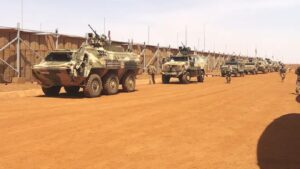The Tightrope Walk of Withdrawal
By the end of May 2024, the Bundeswehr will have withdrawn from Mali. They have to transport tons of material to Germany while fulfilling their mission at the same time. Russia could still play a role as well. It is a radio message with immediate effect: “Alarm for the Quick Reaction Force,” echoes from the walkie-talkie. For the approximately 50-member Quick Reaction Force (QRF) of the Bundeswehr in the crisis state of Mali, this means dropping everything and responding. The reaction to the radio message is immediately noticeable throughout the German Castor camp.
Equipped with fragmentation protection vests, soldiers race through the red desert sand, which is 47 degrees in the shade. Motors roar for a few seconds, armored vehicles, in which the heavy weapons for the soldiers are already prepared, pull up. A short briefing, establish radio contact – then the mission could begin. Could – because in this case, it was just an exercise to test the quick reaction of the unit. Be ready for as long as possible
The responsible parties for the radio message had already informed the unit that it was a test. Otherwise, the activation of the Quick Reaction Force would have caused the entire camp in Gao, northern Mali, to go into a frenzy. If the QRF is called, something catastrophic has happened outside- most of the time. “We are on call. That means we are waiting, just like firefighters at home, to leave when there is a fire,” explains squad leader Charlie. The requirement is that the QRF must be ready to drive away within 30 minutes. During the alarm exercise, they managed it in less than 15 minutes.
This “fire brigade unit” is precisely one of those units that will be prepared for readiness in Gao as long as possible. Now that it is clear that the Germans will leave Mali by the end of May 2024. The protection of the base and those who are on patrol outside the protected Castor camp is a top priority until the end. “We want to be on the move outside for as long as possible. Because where we are, others cannot carry out their dark business,” explains contingent leader Heiko Bohnsack in an interview with the ARD capital studio. “Returning is when one is the most vulnerable”
But the Germans in Mali, who have now officially begun their withdrawal, cannot continue this task indefinitely. “Returning is when one is the most vulnerable,” says an enduring soldier’s rule. So Commander Bohnsack and the German troops, in general, have to perform a tricky tightrope walk with the withdrawal.
They have to force themselves to leave the exact material in Mali that is necessary to fulfill the mission without making themselves vulnerable. “A reduction in capabilities always means that the danger for the contingent increases because weapon systems and weapons are taken out,” warns Lieutenant Colonel Frank. He is one of 16 logistics experts who have just flown to Gao to organize the retreat as quietly as possible. This will not be easy. Because the overland route is considered too unsafe; the lion’s share of the material will be flown out by air.
 The German army is in operation in Mali until the end of May 2024. German soldiers are on standby for potential deployment at Camp Castor.
The German army is in operation in Mali until the end of May 2024. German soldiers are on standby for potential deployment at Camp Castor.
Force majeure and flight permits
However, in the next few weeks, the sandstorm and rainy season begins. And that there could be another form of “force majeure” that makes flights difficult, in addition to these natural events, was recently experienced first-hand by the State Secretary in the Ministry of Defense, Siemtje Moller.
When Moller wanted to board a German A400M military transport aircraft on Thursday morning to fly from the German base in neighboring Niger to visit troops in Gao, Mali, there was no permit from the Malian authorities for the flight. The representative from the Ministry of Defense had to switch from the giant grey transport aircraft A400M to a slim and hastily rented civilian aircraft of the Beechcraft type.
Moller did not accuse the Malian authorities of malicious intent: “I do not assume that there was a motivated sabotage of the flight. But that there was actually no clearance due to bureaucratic processes,” she said.
What role does Russia play?
Nevertheless, the Germans should be prepared for the fact that Malian bureaucracy does not always approve return flights on time. And to what extent Russian forces on site, who have settled next to the airfield at the invitation of the Malian troops, and which the Germans also use, could still play a role, is difficult to predict.
Incidentally, the State Secretary Moller was confronted with a further flight problem the day after: cracks were discovered in the front windshield of her government aircraft just before the return flight to Berlin, which led to an unplanned extension of the trip. The extreme heat of up to 60 degrees Celsius on the runway in Niger was likely responsible. This is also a form of force majeure.
